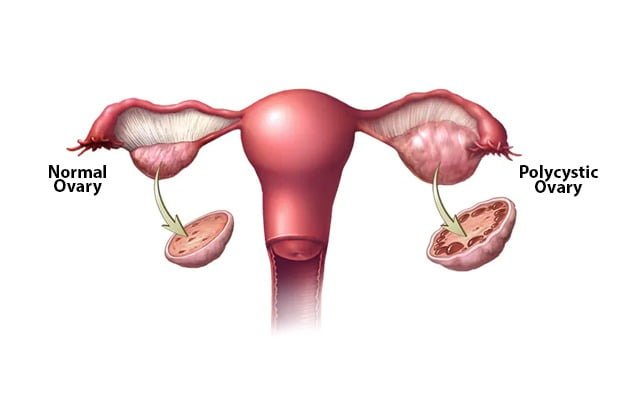Polycystic Ovary Syndrome (PCOS) is a common hormonal disorder that affects individuals with ovaries, often during their reproductive years. Characterized by irregular periods, elevated androgen levels, and cysts on the ovaries, PCOS can have a significant impact on fertility and overall health. Fortunately, advancements in medical science have led to various treatments aimed at managing the symptoms and improving the quality of life for individuals with PCOS. In this blog, we will delve into some of the key polycystic ovary syndrome treatments available, providing hope and insight for those navigating the challenges.
Contents
Can Polycystic Ovary Syndrome Be Cured?
 Polycystic Ovary Syndrome (PCOS) is a chronic condition, generally, there is no known cure for it. However, the symptoms of PCOS can be effectively managed through various treatments and lifestyle modifications. The approach to PCOS management typically involves a combination of lifestyle changes, alongside medical interventions. While there is no outright cure, many individuals with PCOS experience significant improvement in their symptoms and quality of life through diligent management.
Polycystic Ovary Syndrome (PCOS) is a chronic condition, generally, there is no known cure for it. However, the symptoms of PCOS can be effectively managed through various treatments and lifestyle modifications. The approach to PCOS management typically involves a combination of lifestyle changes, alongside medical interventions. While there is no outright cure, many individuals with PCOS experience significant improvement in their symptoms and quality of life through diligent management.
The focus is often on addressing specific concerns, such as regulating menstrual cycles, managing androgen levels, and improving fertility. As research continues, advancements in understanding the underlying mechanisms of PCOS may pave the way for more targeted and effective treatments. Individuals with PCOS must work closely with healthcare professionals to develop a personalized treatment plan that addresses their unique symptoms and concerns.
What Are Some Effective Polycystic Ovary Syndrome Treatments?
Polycystic Ovary Syndrome (PCOS) can be managed through a variety of medical approaches aimed at addressing specific symptoms and hormonal imbalances. Here are some effective polycystic ovary syndrome treatments commonly prescribed:
Birth Control Pills
Birth control pills, also known as oral contraceptives, are a common medical approach for managing Polycystic Ovary Syndrome (PCOS). These pills contain a combination of estrogen and progestin, hormones that help regulate the menstrual cycle. By maintaining a more predictable hormonal balance, birth control pills can effectively manage irregular periods, reduce the risk of endometrial cancer, and alleviate symptoms. Such as acne and excess hair growth are associated with elevated androgen levels.
Anti-Androgen Medications
Elevated androgen levels are a hallmark of PCOS, contributing to symptoms like acne and hirsutism (excess hair growth). Anti-androgen medications, such as spironolactone, work by blocking the effects of androgens on the body’s tissues. Spironolactone, for instance, is an aldosterone antagonist that also has anti-androgenic properties. By interfering with androgen receptors, these medications can reduce the severity of acne and slow down the growth of excess body and facial hair. This class of drugs is often prescribed in conjunction with other treatments to address the cosmetic concerns associated with PCOS.
Metformin
Metformin is a medication commonly used to treat insulin resistance in individuals with PCOS. Insulin resistance is often a key factor in the development of PCOS and contributes to the hormonal imbalances observed in this condition. By improving the body’s response to insulin, metformin helps regulate blood sugar levels, which, in turn, can lead to more regular menstrual cycles and decreased androgen levels. Some individuals with PCOS may also experience weight loss as a secondary benefit, as metformin can contribute to improved metabolic function.
Ovulation Induction Medications
 For individuals with PCOS facing fertility challenges due to anovulation, ovulation induction medications become crucial. Clomiphene citrate and letrozole are commonly prescribed for this purpose. These medications stimulate the ovaries to release eggs, increasing the chances of conception. Ovulation induction is often a first-line approach for those seeking to conceive, and its success is monitored through hormonal assessments and ultrasound imaging.
For individuals with PCOS facing fertility challenges due to anovulation, ovulation induction medications become crucial. Clomiphene citrate and letrozole are commonly prescribed for this purpose. These medications stimulate the ovaries to release eggs, increasing the chances of conception. Ovulation induction is often a first-line approach for those seeking to conceive, and its success is monitored through hormonal assessments and ultrasound imaging.
Gonadotropins
In more complex cases of infertility associated with PCOS, gonadotropins may be used. These are injectable hormones that directly stimulate the ovaries to produce multiple eggs. This approach is typically considered when oral medications like clomiphene citrate or letrozole are not effective in inducing ovulation. While gonadotropins can increase the likelihood of pregnancy, they require careful monitoring due to the risk of multiple pregnancies and ovarian hyperstimulation syndrome.
These medical approaches to managing PCOS are often combined and tailored to the individual’s specific symptoms, health goals, and fertility considerations. Individuals with PCOS need to work closely with their healthcare providers to determine the most effective and personalized treatment plan for their unique circumstances.
What Are Some Lifestyle Changes In Polycystic Ovary Syndrome Treatments?
Lifestyle changes play a crucial role in managing Polycystic Ovary Syndrome (PCOS) and can significantly contribute to symptom improvement and overall well-being. Here are some key lifestyle modifications for individuals with PCOS:
Healthy Diet
Adopting a balanced and nutritious diet is essential for managing PCOS. Focus on whole foods, including fruits, vegetables, lean proteins, and whole grains. Limit the intake of processed foods, sugary snacks, and refined carbohydrates, as these can contribute to insulin resistance, a common concern in PCOS. Some individuals with PCOS may benefit from a low-glycemic-index diet, which helps regulate blood sugar levels.
Regular Exercise
Physical activity is a cornerstone of PCOS management. Regular exercise helps improve insulin sensitivity, aids in weight management, and promotes overall cardiovascular health. Both aerobic exercises (such as brisk walking, jogging, or cycling) and strength training can be beneficial. Aim for at least 150 minutes of moderate-intensity exercise per week, as recommended by health guidelines.
Weight Management
Achieving and maintaining a healthy weight is particularly important for individuals with PCOS, as excess weight can exacerbate hormonal imbalances and insulin resistance. Even a modest weight loss of 5-10% of total body weight can lead to significant improvements in symptoms.
Stress Reduction
Chronic stress can negatively impact hormone levels and exacerbate PCOS symptoms. Incorporate stress-reduction techniques such as mindfulness, meditation, yoga, or deep breathing exercises into your daily routine. Finding healthy outlets for stress can contribute to overall well-being and help manage the psychological aspects of living with a chronic condition.
Adequate Sleep
Quality sleep is essential for hormonal regulation and overall health. Establish a consistent sleep routine, aiming for 7-9 hours of uninterrupted sleep per night. Poor sleep can contribute to insulin resistance and may exacerbate symptoms associated with PCOS.
Hydration
Staying well-hydrated is important for overall health and can support metabolic function. Opt for water as the primary beverage and limit the intake of sugary drinks. Proper hydration can also aid in weight management and help flush toxins from the body.
Regular Health Checkups
Regular monitoring of PCOS symptoms and overall health is crucial. Schedule routine checkups with healthcare providers to assess hormonal levels, address any emerging concerns, and adjust treatment plans as needed. This proactive approach can help manage PCOS effectively over the long term.
Community and Support
Joining support groups or seeking guidance from healthcare professionals specializing in PCOS can provide emotional support and valuable information. Connecting with others who share similar experiences can offer encouragement, motivation, and practical tips for managing PCOS.
It’s important to note that lifestyle changes may take time to show results, and consistency is key. Additionally, individuals with PCOS should consult with healthcare professionals before making significant changes to their diet, exercise routine, or overall lifestyle. A personalized and holistic approach, combining medical treatments with lifestyle modifications, often yields the best outcomes for managing PCOS.
Can I Live Normally With PCOS?
 Absolutely, individuals with Polycystic Ovary Syndrome (PCOS) can lead normal and fulfilling lives with proper management and support. PCOS is a chronic condition, and while there is no cure, there are effective treatments and lifestyle adjustments that can significantly alleviate symptoms and improve overall well-being. By working closely with healthcare professionals, individuals can develop personalized treatment plans that address their specific concerns.
Absolutely, individuals with Polycystic Ovary Syndrome (PCOS) can lead normal and fulfilling lives with proper management and support. PCOS is a chronic condition, and while there is no cure, there are effective treatments and lifestyle adjustments that can significantly alleviate symptoms and improve overall well-being. By working closely with healthcare professionals, individuals can develop personalized treatment plans that address their specific concerns.
Lifestyle plays a crucial role in managing PCOS, and adopting healthy habits can contribute to symptom improvement. Many individuals with PCOS successfully navigate challenges related to fertility, weight management, and hormonal imbalances with the right combination of medical interventions and lifestyle modifications. It’s important to approach PCOS holistically, considering both the physical and emotional aspects of the condition. With advancements in medical research and ongoing support, living well with PCOS is not only possible but achievable.
Conclusion
In conclusion, Polycystic Ovary Syndrome treatments involve a combination of medical treatments and lifestyle adjustments that can significantly improve one’s quality of life. From birth control pills and anti-androgen medications to lifestyle changes like a healthy diet and regular exercise, there are various strategies to manage PCOS symptoms effectively. While there is no cure for PCOS, the key is finding a personalized approach that suits individual needs.
With the support of healthcare professionals, individuals with PCOS can lead normal and fulfilling lives, addressing concerns such as irregular periods, fertility challenges, and hormonal imbalances. By staying informed, adopting healthy habits, and seeking support when needed, it’s possible to navigate the challenges of PCOS and embrace a life that is both happy and healthy. If you are facing PCOS-related issues, PCOS treatment at HerMantra can help. Book your free trial online pcos treatment session now.


